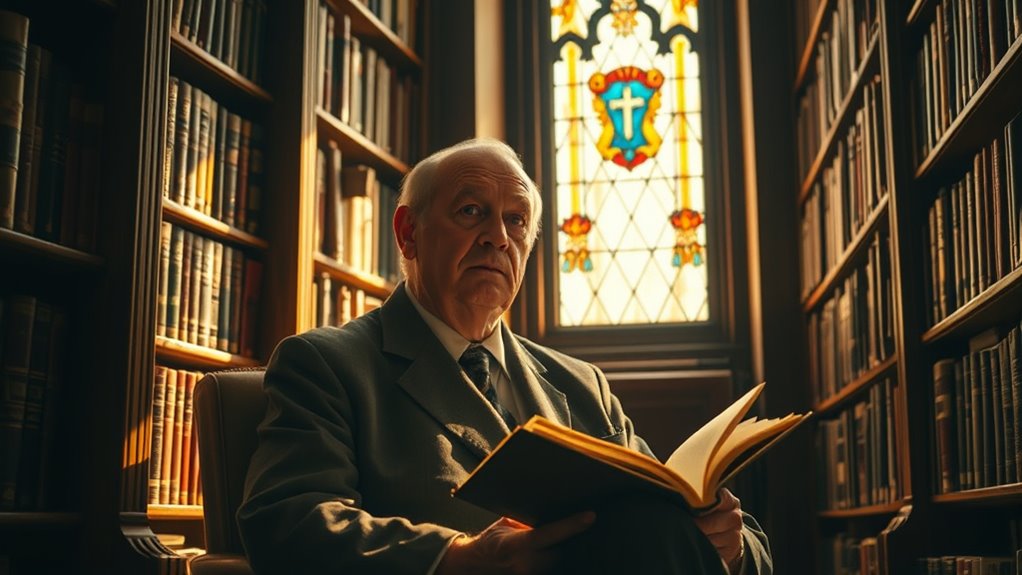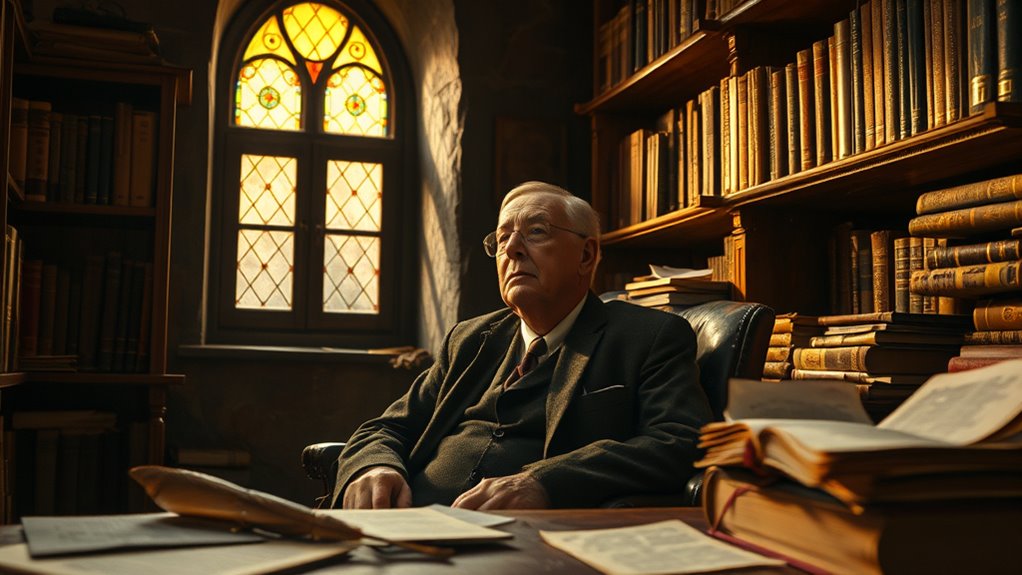You see, C.S. Lewis’s journey from atheism to faith begins with his early skepticism shaped by scientific inquiry, literature, and personal experiences that questioned spiritual realities. His encounters with Christian ideas, moments of wonder, and inner conflict sparked surprising revelations that shifted his worldview. Embracing faith transformed him into a defender of Christian belief, inspiring countless others. If you want to understand how faith can truly change someone’s life, exploring his story offers powerful insights.
Key Takeaways
- Lewis’s childhood experiences with religion and morality laid a foundation that later sparked his curiosity and skepticism.
- His engagement with literature and scientific inquiry fostered a rational, skeptical worldview that challenged religious beliefs.
- Personal encounters with Christian writings, spiritual experiences, and moments of prayer catalyzed his spiritual awakening.
- Unexpected revelations and miracles during his spiritual journey prompted a profound shift from atheism to faith.
- Reflective exploration of imagination and symbolism in literature helped Lewis reconcile reason with spiritual truths, leading to his defense of Christianity.
Early Life and Intellectual Foundations

C.S. Lewis’s early life was shaped by intense philosophical debates and scientific skepticism. Growing up, you’d find him questioning the world around him, often engaging in debates that challenged religious beliefs and emphasized empirical evidence. His education at Oxford exposed him to rigorous intellectual pursuits, fostering a love for literature and philosophy. During this time, he embraced a skeptical worldview, doubting the existence of spiritual realities and prioritizing scientific rationalism. Despite this, his curiosity kept him exploring different ideas, laying a solid intellectual foundation. Lewis’s early skepticism didn’t just stem from academic influences but also from a desire to understand the universe logically. This critical approach became a key part of his journey, setting the stage for his eventual transformation. Additionally, his exposure to empirical evidence and scientific reasoning further reinforced his initial doubts about spiritual claims. Moreover, the increasing complexity of data privacy challenges in his era highlighted the importance of transparency and trust, which became relevant in his later reflections on faith and knowledge.
Atheism and Skepticism in Youth

Growing up immersed in a world of scientific inquiry and philosophical debate, Lewis developed a firm stance of atheism and skepticism during his youth. Engaging regularly in philosophical debates, he questioned religious claims and prioritized empirical evidence. Scientific skepticism shaped his worldview, leading him to view faith as unsubstantiated. His skepticism was rooted in a desire for logical consistency and evidence-based understanding, which made him dismiss spiritual explanations. Additionally, his exposure to home theater projectors and technological advancements may have influenced his appreciation for empirical data and visual clarity, further reinforcing his materialistic worldview. His interest in visual technology and its capacity to provide clear and detailed images may have contributed to his focus on observable and measurable phenomena, shaping his materialistic perspective. Moreover, awareness of divorce statistics and the importance of legal representation in personal and societal contexts could have subtly informed his understanding of the importance of evidence and structured systems in various aspects of life. It wasn’t until later that his openness to new ideas challenged his atheistic assumptions, setting the stage for his eventual spiritual transformation.
The Role of Literature and Imagination

Literature and imagination played a crucial role in shaping Lewis’s journey toward faith, offering a space where ideas could be explored beyond the limits of empirical evidence. Through literary symbolism and imaginative storytelling, he connected abstract concepts to tangible narratives, making spiritual truths more accessible. This approach allowed you to see faith not as a set of rules but as a living, meaningful story.
Literature and imagination reveal spiritual truths beyond logic, transforming faith into a meaningful, living story.
- You learn to interpret symbols that reveal deeper spiritual truths.
- Imaginative storytelling helps bridge the gap between reason and faith.
- Literature becomes a lens to explore moral and divine realities beyond logic alone.
Encounters With Christian Thought

Your curiosity about Christian thought begins to grow as you encounter new ideas that challenge and inspire you. Personal experiences with faith reshape your understanding and open your heart to transformation. Literature plays a key role, inspiring your journey and helping you see the truth in fresh, compelling ways.
Intellectual Curiosity Sparks
C.S. your curiosity was sparked by engaging in philosophical debates and exploring scientific discoveries. These encounters challenged your worldview and opened new perspectives. You found yourself questioning what you thought you knew, seeking deeper understanding. Your mind was drawn to the logical structures of Christian thought, even as you debated atheistic ideas.
Here are three ways these encounters deepened your curiosity:
- They revealed the harmony between science and faith, showing that questioning can lead to truth.
- They pushed you to explore philosophical arguments about morality, existence, and divine purpose.
- They inspired you to read Christian thinkers, realizing that faith could withstand rational scrutiny.
Your intellectual pursuit laid the foundation for your eventual embrace of Christianity.
Personal Encounters Transform
As you engaged more deeply with Christian teachings, these encounters began to reshape your understanding of faith and reason. Miraculous visions and spiritual awakenings challenged your skepticism, opening your eyes to the divine. Each personal experience pushed you closer to belief, transforming doubt into certainty. These moments weren’t just fleeting; they marked a profound shift in your perspective. To illustrate, consider this table highlighting key encounters:
| Encounter Type | Impact | Result |
|---|---|---|
| Miraculous visions | Stirred awe and curiosity | Sparked spiritual interest |
| Personal prayer | Fostered connection with God | Strengthened faith |
| Christian writings | Provided clarity and insight | Deepened understanding |
| Church community | Offered support and fellowship | Built trust |
| Inner awakening | Brought inner peace | Led to spiritual transformation |
Furthermore, the conversion process often involves a series of personal encounters that catalyze profound change, with faith development being a crucial element in this transformative journey. Additionally, cultivating mindful attention can enhance one’s openness to spiritual experiences and deepen personal growth. Recognizing the importance of yarn for scarves in crafting meaningful connections can be metaphorically related to nurturing one’s spiritual journey, where patience and attention to detail foster growth. It is also essential to consider the influence of personal traits and how they can evolve through these transformative experiences, further enriching one’s faith journey.
Literature as Inspiration
Literature serves as a powerful gateway to Christian thought, offering insights that often ignite moments of clarity and inspiration. For you, encountering works that challenge secular humanism and scientific rationality can spark profound reflections. Through stories and essays, you explore moral truths and spiritual realities beyond empirical evidence. These encounters reveal that faith can coexist with reason, encouraging a deeper understanding of divine purpose. Additionally, well-crafted narratives can serve as moral catalysts, inspiring personal growth and spiritual exploration. Recognizing the influence of literary works that depict moral and spiritual struggles can deepen one’s appreciation for faith’s role in personal transformation. Moreover, engaging with such texts can foster a dialogue between faith and reason, enriching your journey of belief and understanding. Embracing existential themes from philosophical insights can further enhance this exploration, prompting you to question and reaffirm your beliefs in a meaningful way. Exploring the psychological benefits of literature can also support this process, providing emotional insights that complement spiritual growth.
The Impact of Personal Experiences

Your personal experiences shaped your understanding of faith and doubt, just as they did for Lewis. Childhood moments with religion, significant losses, and moments of reflection often challenge or strengthen your beliefs. These struggles and growth moments reveal how personal history influences your spiritual journey. For example, encounters with electric bikes and their capabilities can metaphorically mirror personal growth and discovery. Recognizing the importance of lifestyle in shaping one’s outlook can deepen your appreciation for how personal environments influence spiritual development. Additionally, reflecting on family traditions and their role in shaping your worldview can provide further insight into your evolving beliefs. Furthermore, understanding the interpretation of dreams can offer symbolic insights into your subconscious reflections on faith and doubt, enriching your spiritual narrative. Incorporating personal growth perspectives can lead to a more nuanced understanding of how individual experiences forge spiritual pathways.
Childhood Encounters With Faith
Childhood often shapes how we view faith, and for C.S. Lewis, these early years left a lasting impression. His childhood memories include moments of wonder that hinted at a spiritual awakening, planting seeds of curiosity about the divine. These encounters with faith weren’t always explicit but subtly influenced his worldview.
Consider these key insights:
- Early experiences fostered a sense of mystery, later fueling his intellectual exploration.
- Childhood memories of church services and stories shaped his understanding of morality and spirituality.
- These encounters acted as foundational moments, even if he later rejected organized religion, they remained part of his inner landscape.
- Engaging with educational toys that promote curiosity and exploration could similarly nurture a child’s sense of wonder and openness to spiritual ideas.
Your own childhood encounters with faith can similarly influence your perspective, often quietly guiding your journey.
Personal Loss and Reflection
Personal loss often leaves a deep imprint on how you interpret faith and meaning. When you go through grief processing, it forces you to confront life’s uncertainties and your own vulnerability. For C.S. Lewis, losing loved ones sparked moments of intense reflection, pushing him to question what truly matters. These experiences didn’t just bring sorrow; they also triggered a spiritual awakening. Grief opened a space for deeper introspection, making him more receptive to spiritual truths he’d previously dismissed. Personal loss stripped away superficial beliefs, allowing him to search for a more profound understanding of existence. This period of reflection became a pivotal step in his journey, shaping his eventual embrace of faith and guiding him toward a new, meaningful relationship with Christ. Additionally, emotional resilience played a crucial role in helping him navigate his spiritual transformation. Recognizing the importance of spiritual growth, Lewis’s reflections deepened as he processed his grief, ultimately leading to his conversion. His experience also underscored how personal loss can serve as a catalyst for profound change, prompting a reevaluation of deeply held beliefs and values. Moreover, understanding the role of cultural and regional influences in shaping personal beliefs helped him contextualize his spiritual journey within a broader societal framework.
Intellectual Struggles and Growth
Experiencing personal loss often forces you to confront challenging questions that shake your intellectual foundations. These moments push you into intense philosophical debates and prompt you to reassess scientific discoveries you once took for granted. Your struggles may include:
- Questioning the nature of existence amid conflicting scientific evidence.
- Wrestling with the idea that reason alone can’t explain everything.
- Seeking meaning beyond empirical data, which leads to deeper spiritual inquiry.
Through these conflicts, you experience growth as you challenge your beliefs, opening space for new perspectives. Personal loss becomes a catalyst, prompting you to explore faith and reason more thoughtfully. This process transforms your understanding, guiding you from doubt to a nuanced appreciation of both science and spirituality.
The Influence of Friends and Mentors

Friends and mentors played a crucial role in shaping C.S. Lewis’s journey. They offered guidance, challenged his beliefs, and introduced him to a supportive faith community. Their influence helped him navigate spiritual doubts and find clarity. Spiritual mentorship from trusted friends illuminated the path toward faith, providing encouragement during moments of uncertainty. These relationships created a sense of belonging, inspiring him to explore Christianity more deeply. Recognizing the power of genuine connection, Lewis’s friends became catalysts for transformation. Here’s a glimpse of their impact:
| Influence | Support | Transformation |
|---|---|---|
| Faith community | Spiritual mentorship | Inner change |
| Trusted friends | Honest conversations | Renewed belief |
| Encouragement | Shared experiences | Personal growth |
The Role of Doubt and Inner Conflict

Doubt and inner conflict often serve as pivotal forces in shaping a person’s spiritual journey, and C.S. Lewis experienced this firsthand. During his journey, faith uncertainty and spiritual conflict pushed him to question his beliefs deeply. These struggles didn’t weaken his search; instead, they strengthened his resolve to find truth. Recognize that:
- Doubt can be a catalyst for genuine understanding, not just a barrier.
- Inner conflict reveals where your beliefs are fragile, prompting growth.
- Facing spiritual uncertainty often leads to a more authentic faith.
Your struggles with doubt are an essential part of spiritual development. Embracing inner conflict allows you to refine your beliefs, ultimately guiding you toward a clearer understanding of faith.
The Turning Point: Surprising Revelations

You’re about to discover a moment when everything changed for Lewis through an unexpected encounter that challenged his beliefs. This revelation pushed him to question his previous understanding of faith and reason. It’s a pivotal point that reshaped his journey toward Christ.
The Unexpected Encounter
One of the most pivotal moments in C.S. Lewis’s faith exploration occurs during an unexpected encounter that sparks a spiritual awakening. This moment challenges his beliefs and opens a new perspective on faith. It’s a reminder that sometimes, the most profound revelations come when you least expect them.
Key lessons from this encounter include:
- Openness to the unknown — embracing surprises can lead to transformative insights.
- The power of questioning — questioning old assumptions paves the way for growth.
- The importance of personal experience — genuine encounters can inspire a deeper faith journey.
This encounter pushes Lewis beyond skepticism, revealing that faith isn’t always logical but often a profound experience that changes everything.
Challenging Personal Beliefs
A sudden realization can challenge your deepest beliefs, prompting a pivotal shift in perspective. During this moment, you might find yourself questioning long-held assumptions shaped by cultural influences and engaging in intense philosophical debates. These debates often expose contradictions or gaps in your worldview, forcing you to reconsider what you’ve accepted as truth. As you grapple with these revelations, your beliefs may feel fragile, yet this discomfort opens the door to growth. You start to see how cultural norms and philosophical arguments have influenced your thinking, and you realize the need for honest reflection. This process of challenging personal beliefs is essential—it pushes you to confront doubts, ultimately paving the way for a profound transformation.
Embracing Faith and Its Aftermath

Embracing faith marked a profound turning point in C.S. Lewis’s life, sparking a deep spiritual awakening. This faith transformation changed how he saw the world and his purpose. You’ll notice that embracing faith isn’t just a moment; it’s an ongoing process with lasting effects.
Consider these key insights:
- Your worldview shifts as you accept new truths and questions.
- You develop a sense of purpose rooted in spiritual conviction.
- Your life begins to reflect the values and beliefs you now hold dear.
This progression isn’t easy, but it opens the door to growth, understanding, and a renewed sense of hope. The aftermath of faith is a journey of continual discovery and deeper connection with what you believe.
Legacy and Continued Reflection

C.S. Lewis’s legacy continues to shape faith reflections for countless readers worldwide. His writings offer a profound spiritual legacy that challenges skeptics and inspires believers. You can see his influence in how modern thinkers approach questions of faith and reason, bridging the gap between intellect and spirituality. Lewis’s journey from atheism to Christianity reminds you that transformation is possible, encouraging ongoing reflection on your own beliefs. His works serve as a testament to the power of faith to change lives, making his spiritual legacy enduring. As you explore his writings, you’ll find fresh insights into the nature of faith, hope, and love. Lewis’s impact endures, inviting you to reflect deeply and carry his spiritual teachings forward.
Frequently Asked Questions
How Did C.S. Lewis Reconcile His Academic Skepticism With Christian Doctrine?
You see, C.S. Lewis reconciles his skepticism with Christian doctrine through an ongoing dialogue between faith and reason. His intellectual transformation involved questioning his atheistic views, seeking evidence, and embracing the idea that reason can lead to faith. Lewis believed that faith and reason aren’t opposed but complement each other, allowing him to accept Christian truth while respecting his scholarly rigor. This harmony helped him fully embrace his Christian beliefs.
What Specific Literary Works Influenced Lewis’s Spiritual Awakening?
You might find that Lewis’s spiritual awakening was shaped by key literary influences and philosophical inspirations. Works like Dante’s *Divine Comedy* and John Bunyan’s *Pilgrim’s Progress* sparked his imagination and deepened his understanding of faith. Additionally, C.S. Lewis was influenced by writers like George MacDonald and G.K. Chesterton, whose writings challenged his skepticism and opened his mind to Christian ideas, ultimately guiding his journey toward faith.
Did Lewis’s Conversion Process Involve Any Spiritual Visions or Supernatural Experiences?
You might wonder if Lewis’s conversion involved supernatural visions or divine encounters. While he didn’t report dramatic supernatural visions, he did experience profound moments of insight and internal conviction that felt like divine encounters. These spiritual experiences helped shape his faith, but they weren’t typical supernatural visions. Instead, his journey was marked by intellectual reflection and subtle divine nudges, leading him to embrace Christianity wholeheartedly.
How Did Lewis’s Personal Relationships Shape His Faith Journey?
You might find it surprising how friendship dynamics and emotional growth played a vital role in Lewis’s faith journey. When you experience genuine connections, they often challenge your beliefs and broaden your perspective. For Lewis, meaningful relationships with friends like Tolkien and others helped nurture his spiritual curiosity, gradually guiding him toward faith. These personal bonds created a safe space for reflection, making his transformation feel almost like a natural, inevitable coincidence.
What Lesser-Known Writings Reveal Lewis’S Evolving Understanding of Faith?
You’ll find that Lewis’s lesser-known writings, like his mystical writings and philosophical essays, reveal his evolving understanding of faith. These works explore complex ideas about God’s nature, human longing, and spiritual experience. By engaging with these texts, you see how his thoughts deepened beyond mere belief, blending reason and imagination, ultimately shaping his Christian worldview. They show a more intimate, contemplative side of Lewis’s spiritual journey.
Conclusion
Your journey mirrors a winding river, twisting through doubts and discoveries until it finally finds the steady stream of faith. Like Lewis emerging from shadows into sunlight, you realize that even the deepest skepticism can lead to profound understanding. Embracing faith isn’t losing yourself; it’s uncovering a new horizon. As you reflect on Lewis’s transformation, remember that your own voyage is an ongoing story—an unfolding chapter of hope, questioning, and ultimately, belief.










